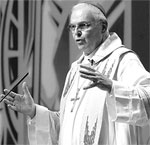 |
 |
|||||
 |
 |
 |
 |
 |
|||
 Auxiliary Bishop Edwin M. Conway, above, vicar general of the Archdiocese of Chicago, celebrates the opening liturgy for the Catholic Health Association’s 89th assembly June 6. Rick Carlson, a health care policy specialist, spoke to members about the ethical implications of new genetic discoveries June 7 at the Chicago meeting. Catholic New World/Karen Callaway |
Catholic leaders must set health care agenda
By Michelle Martin Ongoing work in genetic advancements will change not only the way medicine is practiced, but the way health care is delivered and paid for, a health care policy expert told members of the Catholic Health Association which was meeting in Chicago in early June. The question is not whether things will change, but how, and how to manage the consequences of decisions that will affect generations to come, said attorney Rick Carlson, a professor at Jesuit-run Seattle University and president of the Health Strategies Group. As more and more information becomes available about individual genetic risks, practitioners will be able to tailor the interventions they provide, Carlson said. But that same information will make it impossible for health insurance companies to operate the way they do now, by charging the same premiums for customers with widely different risk factors. “That would be like a car insurance company charging the same for a 16-year-old who just got his license yesterday and a 44-year-old who’s never had an accident,” he said. “We all know the risks aren’t the same.” The title of Carlson’s talk was “Will We Be Good Ancestors?” He discussed genetic advances including stem-cell research, pre-genetic implants and “designer babies.” All are in the early stages of development, he said, and the vast bulk of genetic advances are years away from being applied. He said employers are likely to move toward not providing medical coverage and put the money back into employees’ hand. That could drive genetic advances because patients will be able to choose procedures they want, instead of only those covered by insurance. For the group insurance concept to thrive, the only group broad enough to manage the risk would be the entire public, Carlson said. Otherwise, the trend toward more of the cost of health care being paid by the consumer will continue, he said. That’s already a scandal in a country in which nearly 44 million people, including 8.5 million children and nearly 20 million full-time workers, are without health insurance, said Ronald F. Pollack, executive director of Families USA, a nonpartisan, not-for-profit organization that is working toward universal health coverage. Many of the children who are not covered are eligible for the state children’s health insurance programs, and, indeed, the health care safety net for children is more tightly woven than for adults, said Pollack, who spoke June 8 as part of a panel on providing health coverage for all. Some states also provide higher levels of eligibility for publicly funded health care for parents, but in 42 states adults who are not parents could be penniless and not qualify for public health assistance, Pollack said. “What many Americans don’t understand is that the safety net is more hole than webbing,” he said. The issue directly affects Catholic health care providers both for practical reasons—more than 11 percent of American hospitals are Catholic—and spiritual ones, said Sulpician Father Philip Keane, who was on the panel with Pollack. “The just delivery of health care is a religious and moral issue,” said Keane, focusing on Jesus’ humanity and healing ministry. “We need to focus on social justice in the delivery of health care. How can we be a people who profess faith in Jesus Christ, and not be committed to the just delivery of health care?”
|
||
|
|
|||